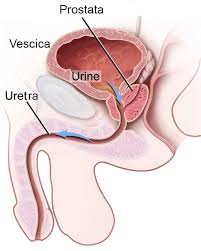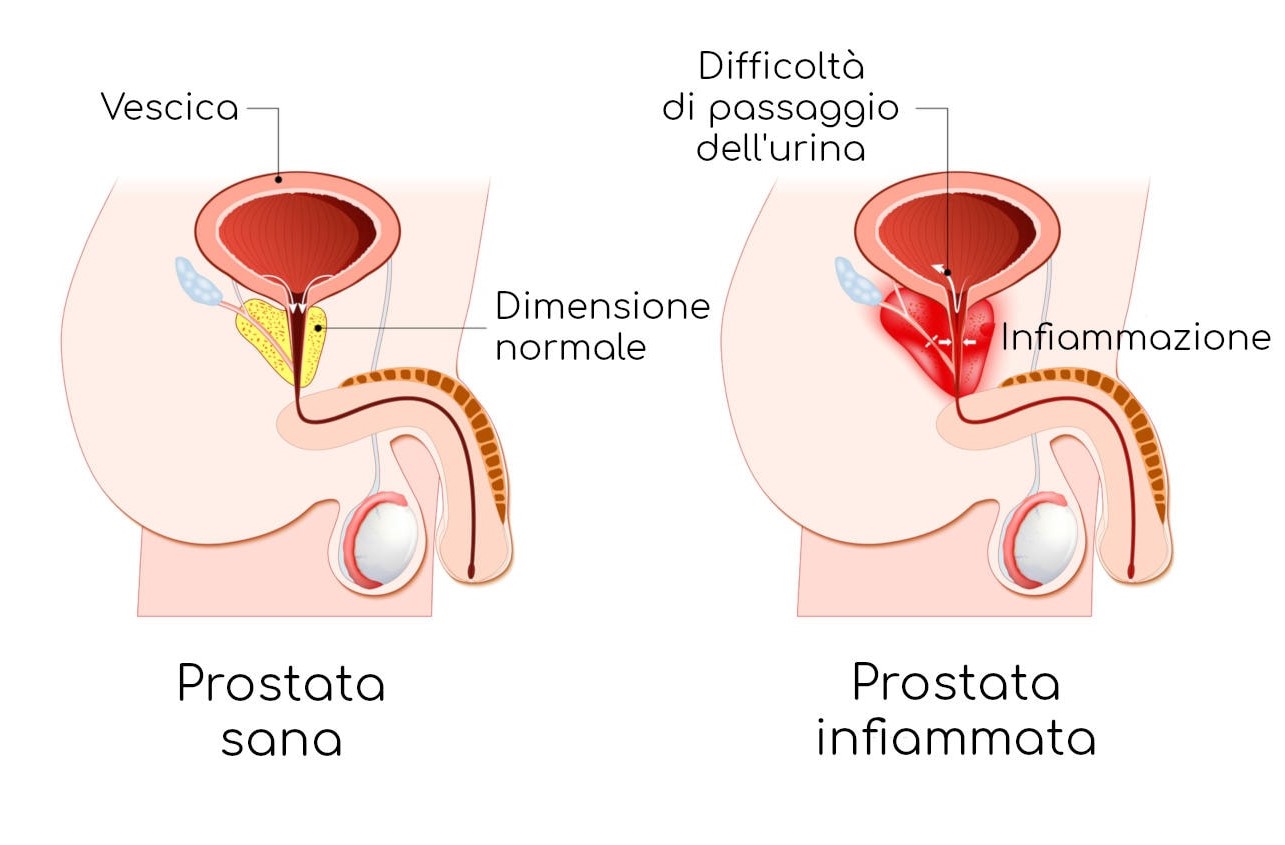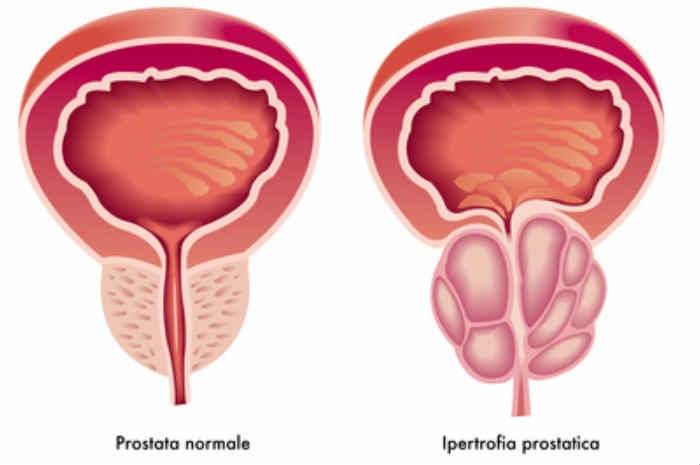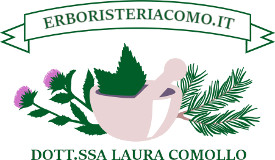Let’s find out more common problems and their symptoms for the prostate, for the men health. Here are also the advice of Dr. Comollo and in particular for BPH and prostatitis useful natural remedies.
Prostate is a male fibromuscular and glandular organ the size of a chestnut, which lies below the bladder and surrounds the urethra. The prostate plays an important role in the production of seminal fluid as it provides essential components to the survival and quality of sperm, so some changes to the structure and state of the organ can affect male fertility. In old age, the organ can undergo a noticeable increase in volume, causing difficulty in urination by compression of the prostatic portion of the urethra.

Prostate problems: prostate diseases
The prostate can be the site of inflammatory diseases: the three most important prostate disesas to mention are
- acute and chronic prostatitis,
- hyperplasia
- carcinoma.
Prostate problems symptoms are various, depending on the pathology: pain (especially in acute prostatitis), blood in the urine, obstruction of emptying the bladder with consequent urinary retention (which predisposes to infection), hypertrophy of the musculature bladder, the formation of bladder diverticula, obstructive uropathy with bilateral hydronephrosis and subsequent acute renal failure.
What is Prostatitis?

The term prostatitis is used to indicate acute or chronic inflammatory conditions of the prostate caused by bacterial infections of the lower urinary tract or urethral catheterization and, more commonly, any other condition in which the signs and symptoms of prostate inflammation are present, but the demonstration of a specific causal agent. The gland is painful and swollen on rectal palpation.
The most common prostatitis symptoms are: pain in the sacrum, perineal or testicular pain, mild dysurias and symptoms of obstruction of the lower urinary tract. In particular, prostatitis can be acute prostatitis or chronic prostatitis. In cases of acute prostatitis the most common symptoms are: fever, chills, dysuria, intense prostate pain. Chronic prostatitis can be bacterial or non-bacterial. Chronic bacterial prostatitis is often asymptomatic, although some complain of perineal or low back pain or obstruction symptoms. Those who have leukocytes in the prostatic fluid and in the urine, emitted after the prostate massage, without bacterial growth in the cultures, are classified as suffering from non-bacterial prostatitis.
What is benign prostatic hyperplasia (BPH)?

Benign prostatic hyperplasia (BPH) is a hyperplastic process and not hypertrophy, as histopathologically it is characterized by an increase in the number of epithelial and stromal cells in the periurethral area of the prostate, not the size. This condition can generally occur starting from 50 years of age. In a given organ, the number of cells and consequently the volume of the organ depend on the balance between cell proliferation and cell death. BPH can be seen in practice as a stem cell disease: when proliferating cells have matured, through a terminal differentiation process, they have a limited duration before undergoing programmed cell death. The aging process induces a block in this maturation process making the progression to definitively differentiated cells is slowed down, thus reducing the overall rate of apoptosis. Despite the importance of male hormones in normal prostate development and in secretory physiology, there is no evidence that they act as direct mitogens for prostate growth in elderly men (no hormones are mitogenic on cultured epithelial cells in culture). However, many growth factors and their receptors are regulated by them.
BPH increases urethral resistance, resulting in compensatory changes in bladder function. The increase in pressure of the detrusor occurs at the expense of the normal function of filling the bladder. This is exacerbated by changes in the bladder and nervous system related to age, causing increased urinary frequency, urinary urgency and nocturia.
Although Benign Prostatic Hypertrophy is in itself a benign pathology, it inevitably leads to a series of severe complications. The first consequence of reduced emptying is urinary retention, which exposes you to the risk of recurrent infections. The increase in pressure in the bladder together with the post-urinary residue may cause a vesicoureteral reflux; if it reaches the kidney, it can cause hydronephrosis and renal failure. At the bladder level, besides the thickening of the muscular, diverticula and calculi can develop. In patients with high post-vesicular bladder residue the bladder is extended beyond its functional capacity and when it overcomes the resistance of the sphincter muscle it gives rise to the phenomenon of incontinence.
Prostate problems: how to prevent
It is certainly important for a man to take care of and monitor his own prostate before it starts to cause problems. Therefore, after 50 years, a urological examination is necessary for a preventive purpose every 12 months as adequate prevention allows to detect any pathologies in an initial stage.
Prostatic hypertrophy and prostatitis: natural remedies
The main plants recommended for the well being of the prostate are: Serenoa Repens, Pygeum Africanum, Cucurbita Pepo (Pumpkin seeds). In general they have similar properties to each other and exert their action on many of the underlying causes of IPB: on the Review “Phytotherapy of Benign Prostatic Hyperplasia. In Minireview “(Phytother, Res. 28: 949-955 (2014)), it is reported that the extract of Serenoa and Pygeum Africanum appears to act by inhibiting cell proliferation, activating apoptosis and exhibiting antioxidant and anti-inflammatory activity.
The German E Commission reports that Serenoa and African Pigeo (cortex) reduce the symptoms of Benign Prostatic Hypertrophy as it leads to reduced residual urine, increased urinary flow and reduced nocturia. It is important to underline that the drug solves the symptomatology without causing decrease in the size of the prostate. The African Pigeo seems to be devoid of serious side effects and works at 360 ° on all prostate problems, even prostatitis. Pumpkin seed extract, on the other hand, seems to reduce DHT (testosterone metabolite) and has a tonic effect on the bladder and anti-inflammatory activity. Comparative studies have shown the effectiveness of the active ingredients of these plants, however, they are devoid of side effects compared to drugs, not compromising sexual activity and not altering the specific prostate antigen.
Since a single plant is not like a synergy of plants and phytocomplexes. The use of phytotherapics in prostatitis patients is widespread; this is not surprising, as conventional drug treatment can be unsatisfactory or have numerous side effects. Here for the benign prostatic hypertrophy and for prostatitis effective natural remedies that we recommend and that you find on Erboristeriacomo.it are a prostate supplement, Prostapygeum, which can also be associated with some bud extracts (sequoia and ribes nigrum).
“Prostapygeum“, that you can find on Erboristeriacomo.it, is a prostate supplement, in tablets, that contains the dry extracts of: Serenoa tit.25% in total fatty acids, of Pygeum africanum E.S. tit. 15% in total phytosterols, Zucca E.S. tit. 20% in micromacinate fatty acids and pollen. It does not contain gluten. We recommend a month of treatment to enjoy the right wellness.
We recommend taking one tablet a day of Prostapygeum, to be taken after lunch or dinner. You need one month of treatment, so don’t suspend before. Do not exceed the recommended daily dose. For a possible synergistic effect you can also associate 1 tablet of turmeric gold for lunch and one of prostapygeum for dinner, always for a month. Prostapygeum hasn’t collateral effect and you can use it as maintenance action, at least three months or until you will do specifical hospital exams.
For any clarification or for more information Contact us.
Follow us on our Facebook and Instagram channels
ALL RIGHT ARE RESERVED, THIS TEXT IS NOT REPRODUCIBLE WITHOUT EXPRESS AUTHORIZATION OF ERBORISTERIA COMO.

